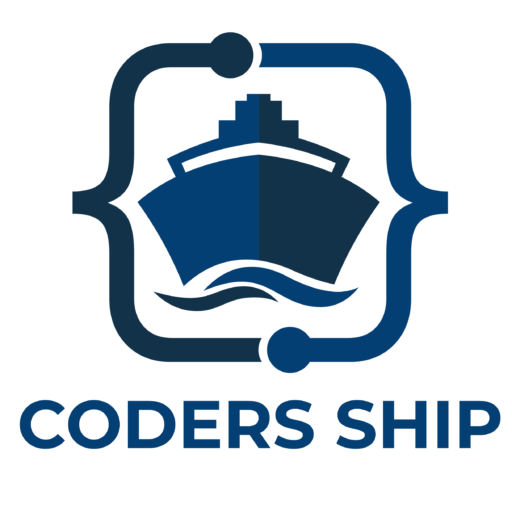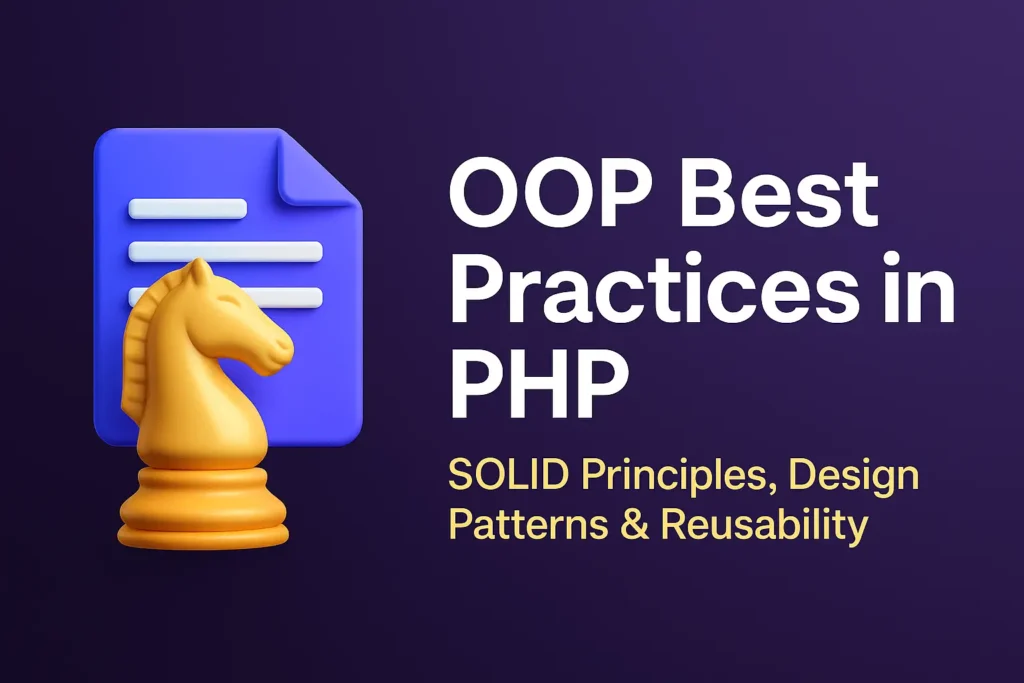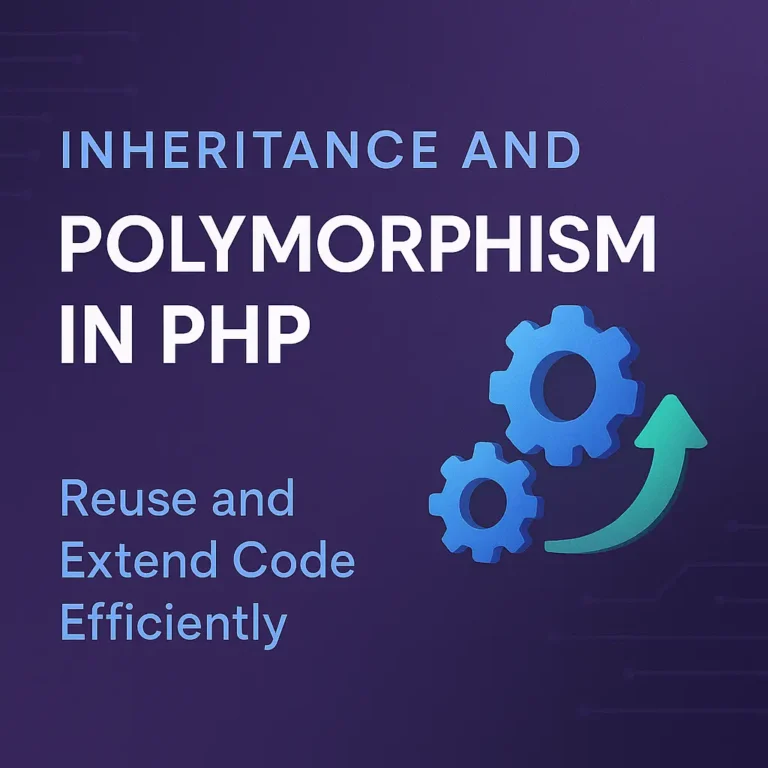Class Naming Conventions
Class names in PHP should be clear, descriptive, and follow a consistent naming convention. The most widely accepted naming convention in PHP is the PSR-1 standard, which recommends using PascalCase (also known as UpperCamelCase).
PascalCase Convention
PascalCase means that each word in the name of the class starts with an uppercase letter, and there are no underscores or spaces between words.
// Good
class UserAccount {}
// Bad
class userAccount {}
class user_account {}
class User_account {}
Descriptive Names
Class names should be descriptive enough to convey their purpose. Avoid generic names like Manager or Handler unless they are part of a larger, descriptive name.
// Good
class UserManager {}
class DatabaseHandler {}
// Bad
class Manager {}
class Handler {}
Namespace Usage
Namespaces help to organize code and prevent naming conflicts. Follow the PSR-4 autoloading standard, which specifies that the fully qualified class name should match its file path.
// Good
class UserAccount {}
// Bad
class userAccount {}
class user_account {}
class User_account {}
Method Naming Conventions
Methods in PHP should follow a clear and consistent naming convention to improve code readability and maintainability. The most commonly used convention is camelCase.
camelCase Convention
In camelCase, the first word is lowercase, and each subsequent word starts with an uppercase letter.
// Good
class User {
public function getUserName() {}
public function setUserName($name) {}
}
// Bad
class User {
public function GetUserName() {}
public function set_user_name($name) {}
}
Verb-Noun Naming
Method names should often be verb-noun pairs that clearly describe what the method does.
// Good
class User {
public function createUser() {}
public function deleteUser() {}
}
// Bad
class User {
public function userCreate() {}
public function removeUser() {}
}
Getter and Setter Methods
For properties, use get and set prefixes.
// Good
class User {
private $name;
public function getName() {
return $this->name;
}
public function setName($name) {
$this->name = $name;
}
}
// Bad
class User {
private $name;
public function name() {
return $this->name;
}
public function name($name) {
$this->name = $name;
}
}
Code Organization
Organizing code in a clear and logical manner is essential for maintaining and scaling PHP applications. Here are some best practices for organizing PHP OOP code.
Single Responsibility Principle (SRP)
Each class should have one responsibility and only one reason to change. This principle makes classes easier to understand, test, and maintain.
// Good
class User {
public function register() {}
public function login() {}
}
class UserProfile {
public function updateProfile() {}
public function getProfile() {}
}
// Bad
class User {
public function register() {}
public function login() {}
public function updateProfile() {}
public function getProfile() {}
}
Organizing Classes by Responsibility
Group classes by their functionality or responsibility. Use directories to reflect this organization.
// Directory structure
src/
Controller/
UserController.php
Model/
User.php
Service/
UserService.php
Repository/
UserRepository.php
Interface Segregation Principle (ISP)
Interfaces should be small and specific to avoid forcing classes to implement methods they do not use. This principle leads to more modular and flexible code.
// Good
interface PaymentProcessor {
public function processPayment();
}
interface RefundProcessor {
public function processRefund();
}
// Bad
interface PaymentOperations {
public function processPayment();
public function processRefund();
}
Dependency Injection
Dependency Injection (DI) is a design pattern that helps to manage class dependencies by passing them as parameters rather than hardcoding them within the class. This makes classes more flexible and easier to test.
// Good
class UserController {
private $userService;
public function __construct(UserService $userService) {
$this->userService = $userService;
}
public function register() {
$this->userService->register();
}
}
// Bad
class UserController {
public function register() {
$userService = new UserService();
$userService->register();
}
}
Using Autoloaders
Use autoloaders to automatically include class files. This follows the PSR-4 autoloading standard and keeps your codebase clean.
// composer.json
{
"autoload": {
"psr-4": {
"App\\": "src/"
}
}
}
composer dump-autoload
// Usage
require 'vendor/autoload.php';
use App\Controller\UserController;
$controller = new UserController();
Avoiding Static Methods
Static methods can lead to tightly coupled code and make testing difficult. Prefer instance methods and dependency injection.
// Good
class Logger {
public function log($message) {
// log message
}
}
class UserService {
private $logger;
public function __construct(Logger $logger) {
$this->logger = $logger;
}
public function register() {
$this->logger->log("User registered");
}
}
// Bad
class Logger {
public static function log($message) {
// log message
}
}
class UserService {
public function register() {
Logger::log("User registered");
}
}
Practical Examples
Example 1: User Management System
Let’s put together a small example of a user management system following the best practices outlined above.
// src/Model/User.php
namespace App\Model;
class User {
private $id;
private $name;
public function getId() {
return $this->id;
}
public function setId($id) {
$this->id = $id;
}
public function getName() {
return $this->name;
}
public function setName($name) {
$this->name = $name;
}
}
// src/Repository/UserRepository.php
namespace App\Repository;
use App\Model\User;
class UserRepository {
public function save(User $user) {
// save user to the database
}
public function find($id) {
// find user by id
}
}
// src/Service/UserService.php
namespace App\Service;
use App\Model\User;
use App\Repository\UserRepository;
class UserService {
private $userRepository;
public function __construct(UserRepository $userRepository) {
$this->userRepository = $userRepository;
}
public function register(User $user) {
// registration logic
$this->userRepository->save($user);
}
public function getUser($id) {
return $this->userRepository->find($id);
}
}
// src/Controller/UserController.php
namespace App\Controller;
use App\Service\UserService;
use App\Model\User;
class UserController {
private $userService;
public function __construct(UserService $userService) {
$this->userService = $userService;
}
public function register() {
$user = new User();
$user->setName('John Doe');
$this->userService->register($user);
}
public function getUser($id) {
return $this->userService->getUser($id);
}
}
Example 2: Dependency Injection Container
Here’s an example of a simple dependency injection container to manage dependencies.
class Container {
private $bindings = [];
public function set($key, $resolver) {
$this->bindings[$key] = $resolver;
}
public function get($key) {
if (isset($this->bindings[$key])) {
return call_user_func($this->bindings[$key], $this);
}
throw new Exception("No binding found for key: $key");
}
}
// Usage
$container = new Container();
$container->set('UserRepository', function() {
return new App\Repository\UserRepository();
});
$container->set('UserService', function($container) {
return new App\Service\UserService($container->get('UserRepository'));
});
$container->set('UserController', function($container) {
return new App\Controller\UserController($container->get('UserService'));
});
$userController = $container->get('UserController');
$userController->register();
Conclusion
Adhering to best practices in PHP OOP is crucial for writing clean, maintainable, and scalable code. By following naming conventions, organizing code logically, and leveraging design principles like SRP and dependency injection, you can ensure that your PHP applications are robust and easy to manage. Whether you are building small applications or large frameworks, these best practices will guide you in writing efficient and effective object-oriented PHP code.






